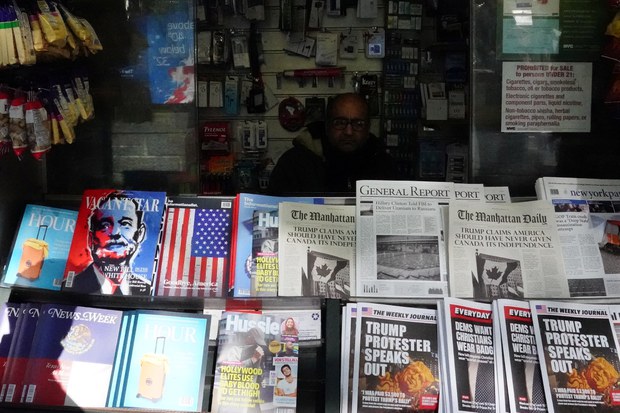Chinese firm helps websites push pro-Beijing content: research
Share

A news stand outfitted with “Fake News” headlines as a stunt pulled off by the Columbia Journalism Review pictured in the Manhattan borough of New York.
A Chinese company in the southern city of Shenzhen has assisted at least 123 websites operating in China but posing as local media outlets in 30 countries across Europe, Asia and Latin America to disseminate disinformation, according to a recent study.
The research lab at the University of Toronto found that Shenzhen Haimaiyunxiang Media Co. (Haimai), a public relations firm, was behind the push to promote pro-Beijing business and political “propaganda,” and vilifying reports of former United States House Speaker Nancy Pelosi and Taiwanese President Tsai Ing-wen meeting when U.S.-China and cross-strait relations were in a highly-sensitive state.
The researchers used the Domain Name System to track down these websites in a campaign named Paperwall, and to dig up the information on Haimai, which has a commercial registration in Shenzhen.
While the report is absolutely credible, it is only part of the truth based on his personal experience, Victor Ho, the former editor-in-chief of the British Columbia version of Sing Tao Daily, told Radio Free Asia.
Beijing has a long history of fighting public opinion wars overseas. There are many seemingly neutral Chinese-language media in Canada that promote Beijing’s “big foreign propaganda,” but it is difficult for ordinary people to discern, he pointed out.
Ho said Canada has numerous so-called pro-Chinese Communist Party media, or media that seem to have no relationship with the CCP, such as Ming Pao, Sing Tao Daily, Today Commercial News, Chinese Canadian Times, Dawa News, Health Times and New Star Times.
“These are all localized names in Canada. There are 20 to 30 CCP’s foreign propaganda media outlets in Canada, shaping the impressions of the Chinese community and many overseas Chinese, or Chinese Canadians, of the CCP,” said Ho.
“If you are new here and undiscerning, you could be watching the CCP’s ‘big foreign propaganda’ all the time, but thinking you are watching Canadian Chinese media. This is quite scary and shocking.”
The Paperwall report found that approximately 100 domains backlinked to Times Newswire, a “supposed newswire service.”
The discovered “fake news” network is huge, 32 of which are targeting readers in South Korea and Japan, 11 are British media, and the rest cover about 30 countries around the world.
Most of the “fake news” comes from Times Newswire, which RFA noticed dispatches press releases and news reports written in multiple languages, such as Korean, Japanese and French, covering politics, economy, culture, current affairs, and sports.
For instance, Roma Journal, which targets Italians and is not legally registered as a news outlet in Italy, often publishes information about U.S. President Joe Biden’s foreign visits. It also republished a large volume of news from Chinese mouthpiece CGTN before and after Pelosi’s visit to Taiwan in August 2022, with headlined articles like “Pelosi is short-sighted and selfish, endangering Sino-U.S. relations.” In addition, there was a video that vilified Tsai Ing-wen titled “Undercovering the Tsai scam,” and an unverified article that Taiwanese military officers only visited the U.S. to eat and have fun.
Another media, Conan Finance News, targeting British audiences, reprinted articles about Hong Kong, including those promoting the “one country, two systems.”
Researcher and author of the report Alberto Fittarelli wrote: “While the campaign’s websites enjoyed negligible exposure to date, there is a heightened risk of inadvertent amplification by the local media and target audiences, as a result of the quick multiplication of these websites and their adaptiveness to local languages and content.”
Haimai did not respond to inquiries and a listed phone number was unreachable, according to a Reuters report. The Chinese Embassy in Washington told the news agency in an email that calling pro-China content and reports “false information” and anti-China content and reports “true information” was “typical prejudice and double standards.”
Translated by RFA staff. Edited by Taejun Kang and Mike Firn.







